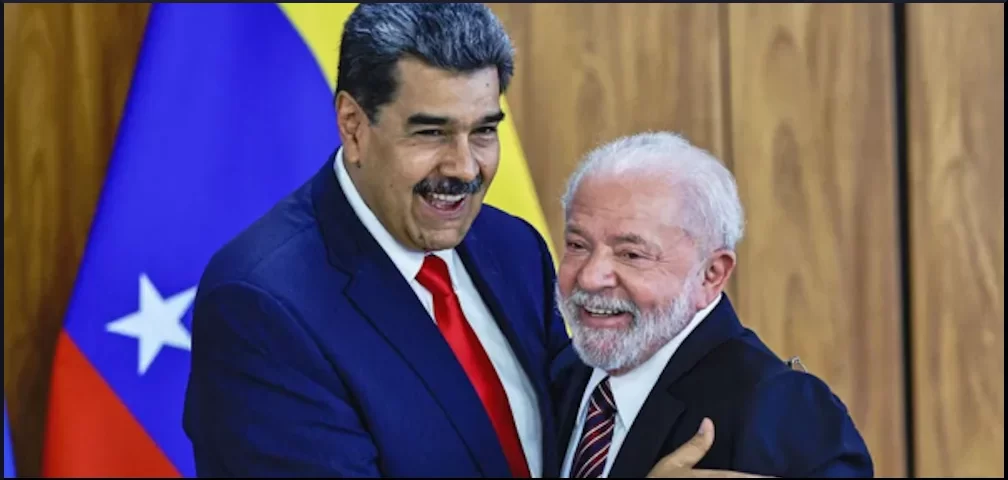by Ricardo Vaz, published on FAIR, June 22, 2023
Venezuela’s Maduro government has slowly and steadily regained its diplomatic standing in recent years, overcoming US endeavors to turn the country into a pariah state as part of its regime-change efforts.
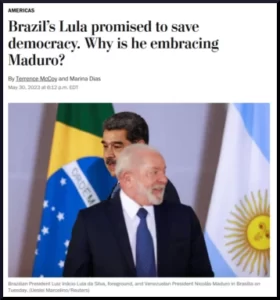
Nevertheless, Washington remains hell-bent on ousting the democratically elected Venezuelan authorities, and has kept its deadly sanctions program virtually intact. And Western media, which have cheered coup attempts at every step of the way (FAIR.org, 6/13/22, 5/2/22, 6/4/21, 4/15/20, 1/22/20), remain committed to endorsing US policies to the bitter end.
This commitment was on full display recently when President Nicolás Maduro was hosted by Brazilian President Lula da Silva, in a major blow against the campaign to isolate Venezuela. Lula added insult to injury by condemning what he called the “narrative” of authoritarianism and lack of democracy that had been built around Venezuela to justify sanctions and regime change.
The Western media establishment’s initial reaction was straight from the five stages of grief. The New York Times, with its unenviable Venezuela reporting record (FAIR.org, 3/26/19, 5/24/19), was in denial, not reporting on the meeting at all. The Financial Times (6/4/23) had a depressed tone, citing the fading hopes of a return to”free and fair elections” in the wake of the Brasilia meeting. The Washington Post (5/30/23) flared in anger, claiming that by hosting Maduro, Lula had betrayed his promise to “save democracy.”
The reporting around the latest developments saw corporate pundits showcasing a full array of journalistic con artistry to defend their “narrative,” including dubious sources, inaccurate conclusions and dishonest context.
Undemocratic references
Corporate media’s effort to dismiss Maduro’s legitimacy is heavily built around the use of negative labels. For example, “authoritarian” appears almost like an auto-fill suggestion at this point, given its prevalence (Financial Times, 6/4/23; BBC, 5/30/23; Reuters, 5/29/23; AP, 5/30/23; Washington Post, 5/30/23; Bloomberg, 5/31/23). Outlets like the Economist (6/1/23) and the Miami Herald (6/3/23) go straight to “dictator.”
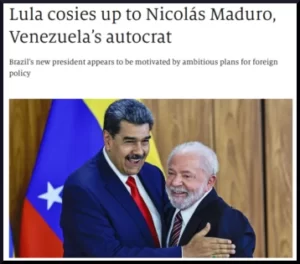
Another dishonest hallmark is casting aspersions on Maduro’s 2018 reelection, with a varied array of labels that go from “disputed” (Financial Times, 6/4/23) and “contested” (BBC, 5/30/23) to “condemned/regarded as a sham” (Le Monde, 5/30/23; Bloomberg, 5/29/23), all the way to “viewed/declared as fraudulent” (Washington Post, 5/30/23; Economist, 6/1/23). We have tackled the unsubstantiated “fraud” claims in previous posts (FAIR.org, 1/27/21, 5/2/22, 1/11/23).
To challenge Maduro’s recognition as Venezuela’s democratically legitimate leader, Western outlets were willing to platform the most undemocratic voices. Brazil’s former President Jair Bolsonaro, for example, was used as a yardstick on Maduro’s legitimacy. Numerous sources repeated that the far-right leader had “banned” the Venezuelan president from entering the country (BBC, 5/30/23; Reuters, 5/29/23; Al Jazeera, 5/29/23; AP, 5/29/23).
This framing is odd, given that Venezuela closed its border with Brazil in February 2019, six months before Bolsonaro’s “ban,” in anticipation of a large-scale operation to violate Venezuelan territory. It’s not as though Maduro had been eager, anyhow, to visit a country that didn’t recognize his government—to attend the Rio Carnival, maybe?
What makes it more remarkable is that many of the same outlets have previously described Bolsonaro as a threat to democracy, given his attacks against the country’s elections and his supporters mimicking the “January 6” playbook in the Brazilian capital (Washington Post, 9/30/22; Financial Times, 9/28/21; BBC, 8/12/22).
The Washington Post (5/30/23) saw no issue in quoting Bolsonaro’s son, a Brazilian senator, despite the numerous accusations of corruption against Flávio Bolsonaro, and Brazil’s electoral authorities fining him for spreading fake news in the 2022 presidential race.
And if there is a character with arguably worse democratic credentials than the Bolsonaro clan, that is former judge and Bolsonaro Justice Minister Sergio Moro. His leading role in the “Operation Car Wash” judicial proceedings has been publicly exposed as unethical and politically motivated, designed to put Lula under arrest and bar him from running in 2018. Still, a number of outlets were happy to simply quote him as an “opposition senator,” who criticized Lula for “hosting a dictator” (BBC Mundo, 5/30/23; Al Jazeera, 5/29/23; Le Monde, 5/30/23, AFP, 5/29/23)
Marred journalism
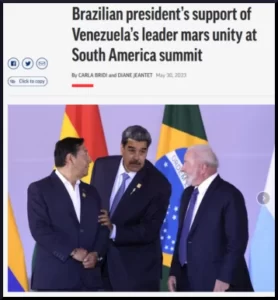
Lula’s meeting and joint presser with Maduro were followed by a summit of South American presidents in Brasilia the next day, the first of its kind in many years, with the goal of kickstarting the regional integration agenda.
Corporate pundits were ready to use Maduro’s presence and Lula’s statements to spin and downplay the meeting, claiming that they had “marred the unity” (AP, 5/30/23), “proven divisive” (AFP, 5/31/23), “clouded the summit” (Bloomberg, 5/30/23) or caused “divergent views” (Reuters, 5/30/23).
The reports relied on public comments from Uruguay’s Luis Lacalle Pou and Chile’s Gabriel Boric, who disagreed with the “narrative” comments but distorted them, making it sound like Lula was claiming that issues like migration or human rights violations were made up. Bloomberg went as far as saying the meeting “made little progress on any substantive issues” as a result of Lula backing Maduro.
However, there are plenty of elements that contradict the media’s precooked conclusions. First off, Lacalle and Boric were only two of the 12 heads of state present. Second, all the representatives, including the two critics, signed the final “Brasilia consensus,” which, among other things, called for an integration roadmap within 120 days (Venezuelanalysis, 6/1/23).
Finally, there was also a careful cherry-picking of Boric’s statements. From the outlets mentioned above, Reuters and AP chose not to mention the Chilean president’s call for US and EU sanctions against Venezuela to be lifted. It would have been more accurate to headline that the summit had found unity in opposing sanctions.
Furthermore, none of the outlets referenced Boric saying he was “happy to see Venezuela return to multilateral instances” where problems can be jointly solved.
Whitewashing sanctions
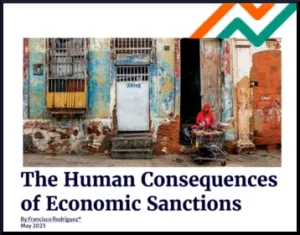
Though opposition to US sanctions were a key issue, stressed in the summit declaration (which refers to them as “unilateral measures”), Lula’s speech and even Boric’s comments—corporate media did their best to downplay or sometimes endorse the deadly unilateral measures.
The mentions of sanctions were virtually devoid of context, be that detailing what US sanctions entail (an oil embargo, trade hurdles, loss of access to financial markets, etc.), referencing studies on their impact (more than $20 billion in yearly losses, over 100,000 estimated deaths), or mentioning criticism from UN experts, multilateral organizations or, most recently, a group of Democratic House members (Venezuelanalysis, 5/11/23).
The measures that groups like the Washington, DC–based Center for Economic and Policy Research class as “collective punishment” against the Venezuelan people were described as sanctions “on [Maduro’s] government” (BBC, 5/30/23; Washington Post, 5/30/23) or against “Maduro and his inner circle” (AFP, 5/31/23).
Equally misguided were some attempts to justify the punishing coercive measures, with the BBC (5/30/23) stating that they were a response to a “crackdown on opposition activists,” and the Associated Press (5/30/23) reporting they were intended to “get Venezuela to liberalize its politics.” Even US officials have stated on the record that sanctions are meant to “accelerate the collapse” of the Maduro government (Voice of America, 10/15/18)—evoking President Richard Nixon’s command to “make the economy scream” in Salvador Allende’s Chile.
The Financial Times (6/4/23), to its credit, admitted openly that sanctions were “intended to force regime change in Caracas.” It then proceeded to inaccurately claim that the Biden administration has “shifted away” from Trump’s “maximum pressure,” when the only difference thus far is a limited license granted to the oil giant Chevron, which places all sorts of hurdles for the Venezuelan state to receive revenue.
Endorsing exceptionalism
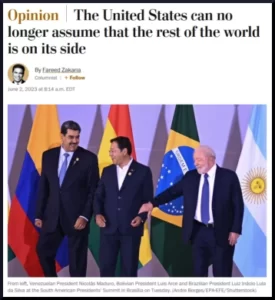
Venezuela’s Maduro government has slowly and steadily regained its diplomatic standing in recent years, overcoming US endeavors to turn the country into a pariah state as part of its regime-change efforts.
Nevertheless, Washington remains hell-bent on ousting the democratically elected Venezuelan authorities, and has kept its deadly sanctions program virtually intact. And Western media, which have cheered coup attempts at every step of the way (FAIR.org, 6/13/22, 5/2/22, 6/4/21, 4/15/20, 1/22/20), remain committed to endorsing US policies to the bitter end.
This commitment was on full display recently when President Nicolás Maduro was hosted by Brazilian President Lula da Silva, in a major blow against the campaign to isolate Venezuela. Lula added insult to injury by condemning what he called the “narrative” of authoritarianism and lack of democracy that had been built around Venezuela to justify sanctions and regime change.
The Western media establishment’s initial reaction was straight from the five stages of grief. The New York Times, with its unenviable Venezuela reporting record (FAIR.org, 3/26/19, 5/24/19), was in denial, not reporting on the meeting at all. The Financial Times (6/4/23) had a depressed tone, citing the fading hopes of a return to”free and fair elections” in the wake of the Brasilia meeting. The Washington Post (5/30/23) flared in anger, claiming that by hosting Maduro, Lula had betrayed his promise to “save democracy.”
The reporting around the latest developments saw corporate pundits showcasing a full array of journalistic con artistry to defend their “narrative,” including dubious sources, inaccurate conclusions and dishonest context.
